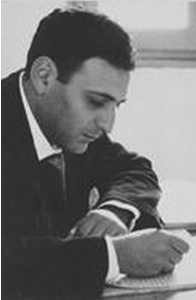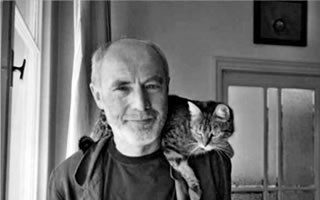De Argentijnse schrijver Juan José Saer werd geboren in Serodino op 28 juni 1937. Hij studeerde in Santa Fe aan de Universidad Nacional del Litoral rechtsgeleerdheid en filosofie. Dankzij een beurs kon hij in 1968 naar Parijs verhuizen, waar hij zou blijven wonen tot zijn dood in 2005. Saer, die kort daarvoor met pensioen was gegaan als hoogleraar aan de Universiteit van Rennes, had op dat moment bijna zijn laatste roman La Grande voltooid. Deze werd nog datzelfde jaar postuum gepubliceerd. In 2006 volgde Trabajos, een bundel literaire kritieken over Latijns-Amerikaanse en Europese schrijvers. Een terugkerend thema in het werk van Saer was de positie van de in zelfgekozen ballingschap verblijvende auteur. Hij besprak dit aan de hand van de levens van twee tweelingbroers, waarvan tijdens de dictatuur in Argentinië de ene in dat land bleef, terwijl de andere – net als Saer zelf – naar Parijs trok. Net als verschillende generatiegenoten, zoals Cesar Aira, Roberto Bolaño en Ricardo Piglia, goot Saer zijn werk vaak in een specifiek en vastomlijnd genre, zoals dat van misdaadromans (La pesquisa, 1994), koloniale ontmoetingen (El testigo, 1990), reisverhalen (El rio sin orillas, 1991) of in de stijl van schrijvers als Marcel Proust (La mayor, 1976) of James Joyce (Sombras sobre vidrio esmerilado, 1992). Saer schreef ook gedichten en enkele scenario’s voor korte films. Werk van hem werd vertaald in het Duits, Engels, Frans, Italiaans en Portugees. Voor zijn roman La ocasión kreeg hij in 1987 de Premio Nadal.
Uit: Ermittlungen (Vertaald door Hanna Grzimek)
„Morvan wußte das. Und er wußte auch, daß es bei Einbruch der Dunkelheit geschah, dann, wenn die uralte, abgenutzte Schlammkugel, die sich eisern immer weiterdrehte, den Punkt verlagerte, auf welchem sie, er und jener Ort genannt Paris, sich bewegten, diesen von der Sonne entfernte und seiner eitlen Helligkeit beraubte, er wußte, daß es gewöhnlich um diese Zeit geschah, daß jener Schatten, den er seit neun Monaten verfolgte und der so nah und unerreichbar war wie sein eigener Schatten, aus seiner staubigen Dachkammer trat, um zuzuschlagen. Und dies hatte er schon – haltet euch fest – siebenundzwanzigmal getan.
Die Leute dort leben länger als an irgendeinem anderen Ort auf diesem Planeten, man lebt, wenn man Franzose oder Deutscher ist, länger als ein Afrikaner, und, wenn man Franzose ist, lebt man scheinbar länger, wenn man Stadtmensch ist, als ein Bauer zum Beispiel, und wenn man aus der Stadt ist – immer statistisch gesehen – lebt man viel länger, wenn man Pariser ist, als wenn man aus irgendeiner anderen Stadt kommt, und wenn man Pariser ist, lebt man viel länger, wenn man eine Frau ist, als wenn man ein Mann ist – und etwas Wahres muß an all dem dran sein, denn in Paris gibt es alte Damen in Fülle, adlige, bürgerliche, kleinbürgerliche oder proletarische, verhärmte alte Jungfern oder ungebundene Frauen, die darüber immer älter wurden, daß sie sich hüteten, ihre stolze Unabhängigkeit zu verlieren, Witwen von Notaren oder Ärzten, Kaufleuten oder Untergrundbahnschaffnern, ehemalige Marktweiber oder Zeichen- und Gesangslehrerinnen, Romanschriftstellerinnen in der Blüte ihres Schaffens, eingewanderte Russinnen oder Kalifornierinnen, alte Jüdinnen, welche die Deportationen überlebt haben, und sogar alte Cocottes, die von einem Zensor, strenger als die guten Sitten, gezwungen wurden, sich zur Ruhe zu setzen: ich meine die Zeit. Jeden Morgen sieht sie das Tageslicht wieder herauskommen, je nach Rang aufgetakelt oder fast in Lumpen, wie sie die bunten Regale der Supermärkte skeptisch in Augenschein nehmen, oder wie sie bei schönem Wetter auf den dunkelgrünen Bänken der Plätze und Alleen sitzen, allein und steif aufgerichtet oder in angeregtem Gespräch mit irgendeinem anderen Exemplar ihrer Spezies, oder wie sie in bereits auf Postkarten verewigter Haltung Brotkrumen an Tauben verfüttern; im Frühling kann man sie des Morgens im Hauskleid ausmachen, wie sie den Oberkörper in die Leere geneigt, mit Hingabe am Fenster eines fünften oder sechsten Stockwerks blühende Geranien gießen.“

Juan José Saer (28 juni 1937 – 11 juni 2005)
De Franse schrijver Florian Zeller werd op 28 juni 1979 in Parijs geboren. Zie ook mijn blog van 28 juni 2007 en ook mijn blog van 28 juni 2008.
Uit: Les amants du n’importe quoi
“Quand il était plus jeune, étudiant, il avait ressenti la même incapacité à savoir quelle vie il désirait. Il enviait secrètement ceux qui, par manque de talent ou par vocation, ne se posaient plus la question. Il avait fait ses études comme on se laisse emporter par un courant calme. Rien d’autre que cette indifférence ne l’avait prédestiné aux études de droit, puis au carnaval de diplômes dont il pouvait se prévaloir. Il avait maintenant une respectabilité et un pouvoir d’achat. C’était bien. La réussite professionnelle lui semblait être l’exigence la plus accessible puisque au fond elle ne dépend que de soi. Rien n’était comparable aux tourments que l’on pouvait ressentir auprès des femmes – et ces tourments étaient à la mesure de ce qu’il pressentait en lui.”
Florian Zeller (Parijs, 28 juni 1979)
De Oostenrijkse schrijfster Marlene Streeruwitz werd geboren op 28 juni 1950 in Baden bij Wenen. Zie ook mijn blog van 28 juni 2007 en ook mijn blog van 28 juni 2008.
Uit: Verführungen
„Das Telefon läutete um 3 Uhr in der Nacht. Püppi war am Apparat. Helene müsse sofort kommen. Sofort. Dringend. Oder hätte sie besseres zu tun, als sich um ihre Freundin zu kümmern. Sei sie beschäftigt. Mit einem Schweden vielleicht? Helene zog sich an. Sie legte Zettel auf ihr Bett und vor die Wohnungstüre der Großmutter nebenan. Auf die Zettel hatte Helene die Telefonnummer von Püppi geschrieben. Falls eines der Kinder aufwachen und sie suchen sollte. Püppi wohnte in der Karolinengasse. Im 4. Bezirk. Beim Belvedere. Helene fuhr über den Franz Josephs-Kai und den Ring zur Prinz Eugen Straße. In der Nähe der Innenstadt waren die Straßen belebt. Im 19. Bezirk und dann im 4. war niemand auf der Straße. Eine Funkstreife stand vor der türkischen Botschaft. An der Ecke der Karolinengasse und Prinz Eugen Straße. Die Polizisten musterten Helene beim Vorbeifahren. Helene fragte sich, was sie diesmal vorfinden würde. Püppi hatte ruhig geklungen. Geheimnisvoll. Vorwurfsvoll. Aber zusammenhängend. Die Heizung im Auto hatte erst am Schwedenplatz zu wärmen begonnen. Durchfroren lief Helene die Stiegen in der Karolinengasse 9 hinauf. Helenen hatte einen Haustorschlüssel. Für solche Anlässe. Es gab keine Gegensprechanlage. Nicht einmal Glocken. Wollte man zu Püppi, mußte man erst anrufen. Oder man war geschickt genug, ein Steinchen gegen die Fenster im 5. Stock zu werfen. Die Wohnungstür war angelehnt. Die Tür zu Sophies Zimmer stand weit offen. Helene ging hinein. Das thailändische Kindermädchen saß in der Ecke hinter Sophies Bett.“

Marlene Streeruwitz (Baden, 28 juni 1950)
De Nederlandse dichteres en schrijfster Fritzi Harmsen van Beek werd geboren in Blaricum op 28 juni 1927. Fritzi Harmsen van Beek overleed op 4 april van dit jaar. Zie ook mijn blog van 28 juni 2008 en ook mijn blog van 10 april 2009.
Goed Begrepen!
(opdracht aan mijn dooie hond)
Als je
weerkomt, indien je: ik stuit de wateren, de sluizen
stut, indien en domp ik de wind! Zo. Droog, Snel en
Niet omzien, het Diep van Aduard Oversteken; recht van
uit je graf in Tandartsebosje draafje Losjes, Onverschillig
liefst, naar het land van Pon. Waar ik je opwacht bij
de brug indien, een blinkende kluif in elke hand, je me
terug keert. En verdrijf het gehoornde vee aldaar, die
olle halfheilige treiterborsten, met behulp van Pan.
(Omkopen met druiven denk ik. Fluiten? Gooien met kikkers.
Misschien.) En noem je namen, O Lipoe m’n Pootjesslang:
‘Sierlijke Reigersbek, Steelse Gep, Fluwelia, Schele
Puiloog en Hondester’, o Onberispelijke, herken je me dan?
‘Ai vlug dus, vraag Orion verlof nu! Wat maakt die spat
hem op zijn twinkelende eeuwigheid! Zijn kennels puilen
uit van sterren, zijn velden zijn ermee bedauwd, hij
stoft ze van zijn jagerslaarzen, bij bossen, rivieren
vol, op bergen stapelt hij de speelse zielen, Alle
Jachthonden! Hij mist je niet en wat dan nog: voor eventjes?
Als de wind dus! nu alsdewind, voordat ikzelf vertrokken
want daaromtrent allesbehalve rustig ben, dus hopsa, kom
en vlùg nu waarachtig, ik kan en wil niet langer, te
wachten ach, en wat me daarna staat.
Fritzi Harmsen van Beek (28 juni 1927 – 4 april 2009)
De Poolse dichter, vertaler en uitgever Ryszard Krynicki werd geboren op 28 juni 1943 in St.Valentin, Lager Wimberg, Oostenrijk. Zie ook mijn blog van 28 juni 2007 en ook mijn blog van 28 juni 2008.
Voorbijkomend
Komend voorbij een huis in de voorstad
Zie ik vluchtig door een open raam
Een oude man, eenzaam etend
Aan een helder verlichte tafel.
Wie heeft mij het recht gegeven
Om mij af te vragen
Of hij die nu het brood breekt en nuttigt
Ooit zijn vrienden of zichzelf
Heeft moeten verloochenen
Om te overleven,
Of er geen vreemd bloed aan zijn handen kleeft,
Of zijn gezicht
Nooit is bespuwd.
Vertaald door Gerard Rasch.
Ryszard Krynicki (St.Valentin, 28 juni 1943)
De Amerikaanse schrijver en journalist Mark Helprin werd geboren in New York op 28 juni 1947. Zie ook mijn blog van 28 juni 2007 en ook mijn blog van 28 juni 2008.
Uit: Ellis Island: And Other Stories (The Schreuderspitze)
“In Munich are many men who look like weasels. Whether by genetic accident, meticulous crossbreeding, an early and puzzling migration, coincidence, or a reason that we do not know, they exist in great numbers. Remarkably, they accentuate this unfortunate tendency by wearing mustaches, Alpine hats, and tweed. A man who resembles a rodent should never wear tweed.
One of these men, a commercial photographer named Franzen, had cause to be exceedingly happy. “Herr Wallich has disappeared,” he said to Huebner, his supplier of paper and chemicals. “You needn’t bother to send him bills. Just send them to the police. The police, you realize, were here on two separate occasions!”
“If the two occasions on which the police have been here had not been separate, Herr Franzen, they would have been here only once.”
“What do you mean? Don’t toy with me. I have no time for semantics. In view of the fact that I knew Wallich at school, and professionally, they sought my opinion on his disappearance. They wrote down everything I said, but I do not think that they will find him. He left his studio on the Neuhausstrasse just as it was when he was working, and the landlord has put a lien on the equipment. Let me tell you that he had some fine equipment-very fine. But he was not such a great photographer. He didn’t have that killer’s instinct. He was clearly not a hunter. His canine teeth were poorly developed; not like these,” said Franzen, baring his canine teeth in a smile which made him look like an idiot with a mouth of miniature castle towers.“

Mark Helprin (New York, 28 juni 1947)
De Franse schrijver, filosoof en componist Jean Jacques Rousseau werd geboren in Genève op 28 juni 1712. Zie ook mijn blog van 28 juni 2006 en ook mijn blog van 28 juni 2007 en ook mijn blog van 28 juni 2008.
Uit: Émile ou De l’éducation
« Émile n’aura ni bourrelets, ni paniers roulants, ni chariots, ni lisières ; ou du moins, dès qu’il commencera de savoir mettre un pied devant l’autre, on ne le soutiendra que sur les lieux pavés, et l’on ne fera qu’y passer en hâte. Au lieu de le laisser croupir dans l’air usé d’une chambre, qu’on le mène journellement au milieu d’un pré. Là, qu’il coure, qu’il s’ébatte, qu’il tombe cent fois le jour, tant mieux : il en apprendra plus tôt à se relever. Le bien-être de la liberté rachète beaucoup de blessures. Mon élève aura souvent des contusions ; en revanche, il sera toujours gai. Si les vôtres en ont moins, ils sont toujours contrariés, toujours enchaînés, toujours tristes. Je doute que le profit soit de leur côté.
Un autre progrès rend aux enfants la plainte moins nécessaire : c’est celui de leurs forces. Pouvant plus par eux-mêmes, ils ont un besoin moins fréquent de recourir à autrui. Avec leur force se développe la connaissance qui les met en état de la diriger. C’est à ce second degré que commence proprement la vie de l’individu ; c’est alors qu’il prend la conscience de lui-même. La mémoire étend le sentiment de l’identité sur tous les moments de son existence ; il devient véritablement un, le même, et par conséquent déjà capable de bonheur ou de misère. Il importe donc de commencer à le considérer ici comme un être moral. »
Jean-Jacques Rousseau (28 juni 1712 – 2 juli 1778)
Buste van Jean-Antoine Houdon
De Italiaanse schrijver Luigi Pirandello werd op 28 juni 1867 geboren in de villa ‘Caos’ (chaos) in de buurt van Agrigento. Zie ook mijn blog van 28 juni 2007 en ook mijn blog van 28 juni 2008.
Uit: Six Characters in Search of an Author (Vertaald door Edward Storer)
The Manager [throwing a letter down on the table]. I can’t see [To PROPERTY MAN.] Let’s have a little light, please!
Property Man. Yes sir, yes, at once. [A light comes down on to the stage.]
The Manager [clapping his hands]. Come along! Come along! Second act of “Mixing It Up.” [Sits down.] [The ACTORS and ACTRESSES go from the front of the stage to the wings, all except the three who are to begin the rehearsal.]
The Prompter [reading the “book”]. “Leo Gala’s house. A curious room serving as dining-room and study.”
The Manager [to PROPERTY MAN]. Fix up the old red room.
Property Man [noting it down]. Red set. All right!
The Prompter [continuing to read from the “book”]. “Table already laid and writing desk with books and papers. Book-shelves. Exit rear to Leo’s bedroom. Exit left to kitchen. Principal exit to right.”
The Manager [energetically]. Well, you understand: The principal exit over there; here, the kitchen. [Turning to actor who is to play the part of SOCRATES.] You make your entrances and exits here. [To PROPERTY MAN.] The baize doors at the rear, and curtains.
Property Man [noting it down]. Right!
Prompter [reading as before]. “When the curtain rises, Leo Gala, dressed in cook’s cap and apron is busy beating an egg in a cup. Philip, also dresesd as a cook, is beating another egg. Guido Venanzi is seated and listening.”
Leading Man [To MANAGER]. Excuse me, but must I absolutely wear a cook’s cap?
The Manager [annoyed]. I imagine so. It says so there anyway. [Pointing to the “book.”]
Leading Man. But it’s ridiculous!
The Manager [jumping up in a rage]. Ridiculous? Ridiculous? Is it my fault if France won’t send us any snore good comedies, and we are reduced to putting on Pirandello’s works, where nobody understands anything, and where the author plays the fool with us all? [The ACTORS grin. The MANAGER goes to LEADING MAN and shouts.] Yes sir, you put on the cook’s cap and beat eggs. Do you suppose that with all this egg-beating business you are on an ordinary stage? Get that out of your head. You represent the shell of the eggs you are beating! [Laughter and comments among the ACTORS
.] Silence! and listen to my explanations, please! [To LEADING MAN.] “The empty form of reason without the fullness of instinct, which is blind.” — You stand for reason, your wife is instinct. It’s a mixing up of the parts, according to which you who act your own part become the puppet of yourself. Do you understand?“
Luigi Pirandello (28 juni 1867 – 10 december 1936)
De Duitse dichter en schrijver Otto Julius Bierbaum werd geboren op 28 juni 1865 in Grünberg. Zie ook mijn blog van 28 juni 2007.
Traum durch die Dämmerung
Weite Wiesen im Dämmergrau;
Die Sonne verglomm, die Sterne ziehn;
nun geh ich zu der schönsten Frau,
weit über Wiesen im Dämergrau,
Tief in den Busch von Jasmin,
Durch Dämmergrau in der Liebe Land;
Ich gehe nicht schnell, ich eile nicht;
Mich zieht ein weiches, samtenes Band
durch Dämmergrauin der Liebe Land,
In ein blaues, mildes Licht.
Komm her und laß dich küssen
Die Luft ist wie voll Geigen,
Von allen Blütenzweigen
Das weiße Wunder schneit;
Der Frühling tobt im Blute,
Zu allem Uebermute
Ist jetzt die allerbeste Zeit.
Komm her und laß dich küssen!
Du wirst es dulden müssen,
Daß dich mein Arm umschlingt.
Es geht durch alles Leben
Ein Pochen und ein Beben:
Das rote Blut, es singt, es singt.
Otto Julius Bierbaum (28 juni 1865 – 1 februari 1910)
De Amerikaanse schrijver, en biograaf Aaron Edward Hotchner werd geboren op 28 juni 1920 in St. Louis. . Zie ook mijn blog van 28 juni 2007.
Uit: The Good Life According to Hemingway
„In the beginning I was not making any money at it, and I just wrote as well as I could—the editors didn’t like it, but someday they would. I really didn’t care about criticism. The best thing about your early days is that you are not noticed. You don’t have to deal with criticism, and you really enjoy your workdays. You think it’s easy to write and you feel wonderful, but you’re not thinking about the reader, who is not having much enjoyment. But when you start to mature and begin to write for the reader, writing becomes more difficult. In fact, when you look back on anything you’ve written, what you recall is what a tough go it was. Every day the rejected manuscripts would come back through the slot in the door of that bare room where I lived over the Montmartre sawmill. They’d fall through the slot onto the wood floor, and clipped to them was that most savage of all reprimands—the printed rejection slip. The rejection slip is very hard to take on an empty stomach, and there were times when I’d sit at that old wooden table and read one of those cold slips that had been attached to a story I had loved and worked on very hard and believed in, and I couldn’t help crying. When the hurt is bad enough, I cry.
When a writer first starts out, he gets a big kick from the stuff he does, and the reader doesn’t get any; then, after a while, the writer gets a little kick and the reader gets a little kick; and, finally,if the writer’s any good, he doesn’t get any kick at all and the reader gets everything.“
A. E. Hotchner (St. Louis, 28 juni 1920)
De Engelse schrijver Eric Ambler werd geboren op 28 juni 1909 in Londe. Hij werkt eeerst als schrijver van reclameteksten. In 1936 had hij voor het eerst succes met zijn roman The Dark Frontier. Dit boek en andere romans uit deze perode gelden tegenwoordig als klassieke werken in het thriller genre.
Uit: Epitaph for a Spy
„I arrived in St. Gatien from Nice on Tuesday, the 14th of August. I was arrested at 11.45 a.m. on Thursday, the 16th, by an agent de police and an inspector in plain clothes and taken to the Commissariat. For several kilometers on the way from Toulon to La Ciotat the railway runs very near to the coast. As the train rushes between the innumerable short tunnels through which this section of the line has been built, you catch quick glimpses of the sea below, dazzlingly blue, of red rocks, of white houses among pine woods. It is as if you were watching a magic-lantern show with highly colored slides and an impatient operator. The eye has no time to absorb details. Even if you know of St. Gatien and are looking for it, you can see nothing of it but the bright red roof and the pale yellow stucco walls of the Hotel de la Reserve. The hotel stands on the highest point of the headland and the terrace runs along the south side of the building. Beyond the terrace there is a sheer drop of about fifteen meters. The branches of pines growing below brush the pillars of the balustrade. But fa
rther out towards the point the level rises again. There are gashes of red rock in the dry green scrub. A few windswept tamarisks wave their tortured branches in silhouette against the intense ultramarine blue of the sea. Occasionally a white cloud of spray starts up from the rocks below.“

Eric Ambler (28 juni 1909 – 22 oktober 1998)
Zie voor onderstaande schrijvers ook mijn blog van 28 juni 2007.
De Zwitserse dichter en schrijver Jürg Federspiel werd geboren op 28 juni 1931 in Kemptthal.



















